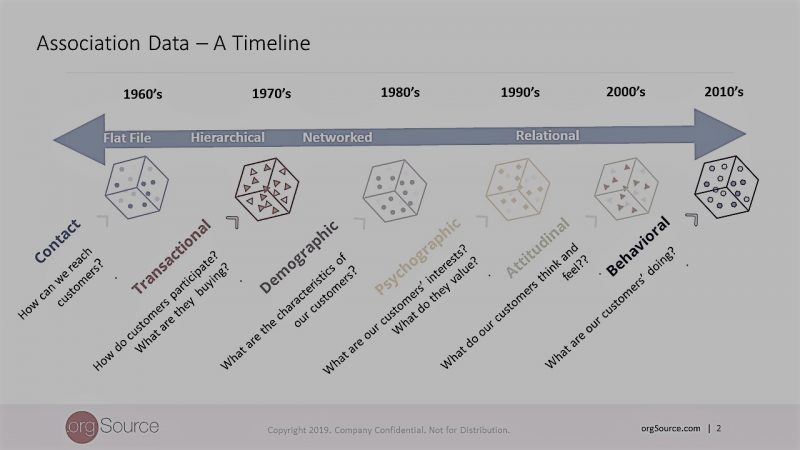The Power to Change Begins With a Question

“Imagine a future where you have the information you need to answer your most critical business questions. A time when you have the confidence to address challenging problems and thrive. And, a culture where you can embrace change, and anticipate a positive result.”
Sharon Rice, .orgSource’s Managing Director of Business Strategy, described that vision to participants at the organization’s September 2019 Solutions Day. Even light-years ago when we could actually attend a conference in person, Rice was contrasting this optimism with concern for the vulnerability of the association industry. Her recommendations have greater urgency than ever as more groups are experiencing precarious circumstances.
Rice’s advice for getting to your organization’s sweet spot is both simple and profound. She tells this story to illustrate her point:
“When I was in fourth grade, I had to write a monthly book report for social studies class. I enjoyed reading the books. But, with every page I turned, the report loomed. The night before the assignment was due, the anxiety became overwhelming. My mother had a solution. She started asking me a series of questions. By the time I’d told her what the book was about, described the characters and explained their relationships and adventures, the report had written itself.”
Take a Curious Approach
Rice believes we’ve got it backward. “Business transformation doesn’t start with a strategy,” she says. “It begins with asking the kind of compelling questions that trigger innovation and drive growth. Consider the impact created by exploring these possibilities”:
- What if we could form a more perfect union?
- What if we could travel to the moon?
- What if a telephone could be used for more than conversation?
“Why,” Rice asks, “doesn’t business routinely center around provocative questions?” In his book, A More Beautiful Question, author and journalist Warren Berger proposes that we’ve been conditioned to value action over analysis. As we move through school, layer upon layer of messaging reinforces the idea that successful students come to class with answers, not questions.
That a curious approach to business is rare among associations suggests the challenge may be greater than simply overcoming habit. Rice notes, “We’re reticent to ask big, compelling questions because we imagine that we don’t have, or can’t access, information that would help us to discover answers.”
At .orgSource, we believe that data is the gateway to knowledge. The strategies that associations use to collect, report on, and analyze this precious commodity are an ongoing area of focus. My workshop, “The Transformative Power of Data,” presents an in-depth exploration of this topic.
Study the Right Data

“One of the things that always surprises workshop participants is how much data their associations are already collecting,” Rice advises. “A treasure trove of numbers, trends, and statistics are hiding in plain sight. Because, like the tree falling in the forest, when no one accesses the data or analyzes and interprets it in a meaningful way, it doesn’t actually exist.” Rice tells this story from her own experience to explain:
“In my early career at APICS, one of our board members was a director of strategy for a supply chain corporation. He was something of a contrarian and always asked probing questions. He scheduled a meeting with the goal of ‘better understanding the APICS member’. We spent hours summarizing information such as average age, salary, sorting members into categories, and running our data through Olympic-worthy acrobatics. We were sure we had nailed his request. After we presented, he took a breath, looked at us and said, ‘So, who is the APICS member, really?’
“That question exposed that our data was superficial. We did not understand our members on a behavioral level. His employer was already well on the way to digital transformation. The company was tracking customers’ buying behavior and studying those details to learn how to target individualized promotions to a diverse audience.”
Be Intentional
Rice and her staff realized that although they were experts at collecting and analyzing data, they had not been asking the questions that would drive engagement or revenue. They needed to reach beyond the numbers to study behavior. Although they were using cyber systems, they were still operating on an analog signal. “While technology drives digital transformation, software and hardware alone don’t deliver utility or meaning, at least not yet,” says Rice. “At the core of digital transformation is our own ability to use these tools to capture, learn, and adapt in almost real time. The beginning of that process is asking the right questions.
“If you’re too busy to ask questions, you need to slow down,” Rice cautions. “Questioning allows us to be intentional. It connects why, what if, and how to ensure that we are gathering the data that matters most. If you’re out of the habit of asking questions, try this. The next time you attend a meeting, take notes in questions.”
Make Time to Practice
Questions are not a routine part of an association job in the way that they are for reporters, physicians, detectives, and lawyers. Most people don’t receive training in school or at work that prepares them to probe below the surface and discover a broader context and deeper meaning. It isn’t hard to ask a good question, you just need to give yourself and your team room to practice. Find the discipline to turn off the voices that are clamoring for answers, and open white space. Here are a few more tips:
- Structure for positive forward momentum using words like where, what, and how.
- Don’t ask questions that can be answered with one word.
- Invite follow-up.
- After a broad question, narrow the focus. Drill down.
- Keep an open mind. Ask to challenge assumptions, not to encourage beliefs.
- Use an objective tone.
- Listen carefully to answers, and acknowledge that you heard what was said.
“Even as a professional facilitator, only about one in five questions that I ask are really going to hit the mark,” says Rice. “But when we ask that one beautiful, powerful question the world opens up and the duds don’t matter. It’s the idea that sparks our imagination and makes all the difference. Associations can, and must, create and execute business strategies that meet the digital market’s needs and transform their organizations. The only way this can happen is if we are all asking questions that point in the direction to future success. Whether you’re a database administrator, a director of operations, or a CEO, that is your job. That is how you will make an impact, and that is the only way to generate the power to change.
